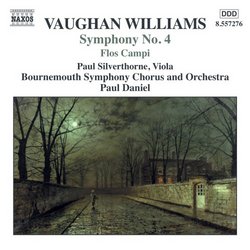| All Artists: Ralph Vaughan Williams, Paul Daniel, Bournemouth Symphony Orchestra Title: Vaughan Williams: Symphony No. 4; Flos Campi Members Wishing: 0 Total Copies: 0 Label: Naxos Release Date: 1/18/2005 Genre: Classical Styles: Forms & Genres, Concertos, Historical Periods, Modern, 20th, & 21st Century, Instruments, Strings, Symphonies Number of Discs: 1 SwapaCD Credits: 1 UPCs: 747313227624, 074731322762 |
Search - Ralph Vaughan Williams, Paul Daniel, Bournemouth Symphony Orchestra :: Vaughan Williams: Symphony No. 4; Flos Campi
 | Ralph Vaughan Williams, Paul Daniel, Bournemouth Symphony Orchestra Vaughan Williams: Symphony No. 4; Flos Campi Genre: Classical |
Larger Image |
CD Details |
CD ReviewsFine Accounts of Three RVW Works J Scott Morrison | Middlebury VT, USA | 02/12/2005 (5 out of 5 stars) "This is, I believe, the final instalment in Naxos's series comprising all of the Ralph Vaughan Williams symphonies. They have not all been conducted by Paul Daniel, as here; the earlier ones were with Kees Bakels leading the Bournemouth Symphony which has been on all the discs. The entire set is one that can compete with the best, and I'm not excepting the sets and single symphonies conducted by Barbirolli, Boult, Handley, Previn, Haitink, Hickox and Thomson. The Fourth is perhaps RVW's most dissonant and violent symphony. Much has been made of the likelihood that it was inspired by the events of Hitler's Germany, but actually it was written, or mostly written, in 1931-32 before Hitler's accession to power in 1933. What inspired it is a mystery, although there have been other theories, including a probably apocryphal one that RVW wanted to prove, after reading a review of a 'modern' new symphony--something he termed a 'freak festival'--that he could write one like that, too. Whatever impelled him to write it, it is, for me, one of his strongest works. The symphony starts with a furious declamation in the orchestra that Daniel and the Bournemouth play with all due ferocity. This sets the tone for passionate expressiveness pervading the entire work. As far as I can hear, Daniel doesn't miss a trick here. His reading is as exciting as Barbirolli's, as neatly molded, particularly in the lyrical passages, as Bryden Thomson's. I simply do not have any criticism of Daniel's conception. Transitions--and there are lots of them, some of them startling--are managed expertly; dynamics are wide but well-judged; brass interjections, so much a part of this symphony, are beautifully done by the Bournemouth players. The Andante is cold enough to make you shiver. The galumphing circus-y atmosphere in the Scherzo is both witty and menacing, mostly the latter. It's not for nothing that Ursula Vaughan Williams commented that this symphony is just like the man himself--'the towering furies of which he was capable, his fire, pride and strength.' Michael Steinberg has commented, rightly, that in this symphony 'the destination is sunlight.' Indeed, the final movement, with its 'epilogo fugato,' is just such an arrival point. (And I love the jaunty echoes of the 'London' Symphony in the finale.) It's not that the fury and aggressiveness have been forgotten, but that they have been conquered and resolved. This is a great symphony--my own favorite of RVW's, if I had to pick--and this is a smashing performance. All hail to Daniel and the Bournemouth for giving us such a marvelous recording. All that, and I haven't even mentioned the companion pieces recorded here--the early First Norfolk Rhapsody and 'Flos Campi' ('The Flower of the Field'). The Rhapsody is given a loving and tender reading; principal violist Stuart Green and the unnamed principal clarinet deserve praise for their important solos in this pastoral masterpiece, so reminiscent of the style of the Tallis Fantasy. 'Flos Campi,' that peculiar combination of solo viola, wordless chorus and orchestra, six movements with superscriptions from the Song of Solomon, is given a stupendous performance here. Violist Paul Silverthorne is eloquent; his playing causes a catch in the throat with its tonal beauty. I believe RVW made a recording with violist Lionel Tertis, but I've never run across it and cannot compare it with this one, but I shan't go looking for other recordings any time soon. I like this one better than the recording with violist Nobuko Imai with Matthew Best and the English Chamber Orchestra. A real winner, this one. TT=62:34 Scott Morrison" Flos Campi Raegen W. Richard | Federated States of Micronesia | 03/06/2005 (5 out of 5 stars) "I am somewhat new to Vaughan Williams, and this is one of the many Naxos recordings of his work that I would highly recommend, especially for those unfamiliar with his work...in terms of price and quality of sound they are unrivaled. For me the Flos Campi is the jewel of this particular installment. It is one of the most haunting pieces of music that I am familiar wiht. That is not to say that all three of the pieces here are not beautiful, for they are terrifically so." Musique et flammes... Ron Roy | Canada | 12/06/2005 (5 out of 5 stars) "Pour qui veut découvrir R.V.W, ce disque contient des oeuvres
parmi ses plus belles. La 4e symphonie, peut-être la plus enfammée de Vaughan William, Norfolk # 1, sereine et pastorale. Flos campi, telle une femme séduisante et étrange. Excellente prise de son. Prix naxos. Si vous voulez découvrir ce Vaughan William, n'hésitez pas. " |
